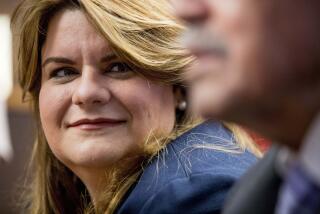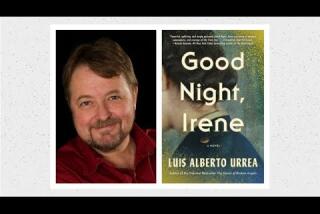Puerto Rican’s 50-Year Goal: Statehood
SAN JUAN, Puerto Rico — The grand old man of Puerto Rico’s statehood movement is Luis A. Ferre, a millionaire philanthropist and former governor.
At 85, the venerated Don Luis is still going strong, overseeing his charitable foundation and chasing an ideal that has eluded him over a political career spanning nearly half a century: U.S. statehood for Puerto Rico.
“I knew that this was going to take time,” he said in an interview a few days before flying to Washington for Senate hearings on Puerto Rico’s future relationship with the United States. “It was a question of waiting for the thing to evolve to the proper time.”
Ferre says that the time has finally come and predicts that a referendum planned for 1991 will see a 60% majority in favor of abandoning Puerto Rico’s status as a U.S. commonwealth and making the Caribbean island the 51st state.
Ferre has played a prominent role in Puerto Rican politics since World War II. He was a member of the assembly that produced the 1952 constitution, founded the pro-statehood New Progressive Party in 1967 and was governor from 1969 to 1972. Today, he is chairman of the island’s Republican Party.
But his most enduring work may be his philanthropy, in particular the Ponce Museum of Art, which London’s Financial Times called “one of the most distinguished private collections in the Western Hemisphere outside the United States.”
Ferre opened the museum in Ponce, his birthplace in southern Puerto Rico, in 1959 with 120 of his own paintings. Today, it houses 500 paintings, including several noted Pre-Raphaelites, along with hundreds of sculptures and artifacts, with a total estimated value of $50 million.
Ferre’s grandfather was a French engineer who worked on the Panama Canal before settling in Cuba. His father, Antonio, moved to Puerto Rico as a young man and married Maria Aguayo Casals, a cousin of the Spanish cellist Pablo Casals, who lived in Puerto Rico.
Ferre studied engineering at the Massachusetts Institute of Technology, where he was captain of the fencing team.
He was trained at the New England Conservatory of Music also. He is an accomplished classical pianist, occasionally performing in public, and still tries to put in a few hours of practice every day.
It was during his university days, Ferre said, that he developed a passion for the “American way of democracy” and eventual statehood for Puerto Rico.
On his return to the island, Ferre got a job as an engineer at the Puerto Rico Iron Works. Later, he and a brother, Joseph, founded the Puerto Rico Cement Co. in Ponce, the source of the family’s wealth.
In his first philanthropic venture, Ferre founded the Ponce Public Library in 1937. At about the same time, he bought the city’s newspaper, El Dia, which was in danger of folding.
“My theory was that a city without a newspaper is a city without a soul,” he said.
When he became governor, Ferre sold the newspaper to his son, Antonio, who moved it to San Juan. It is now the pro-statehood El Nuevo Dia, one of the biggest of Puerto Rico’s four dailies.
More to Read
Sign up for Essential California
The most important California stories and recommendations in your inbox every morning.
You may occasionally receive promotional content from the Los Angeles Times.










